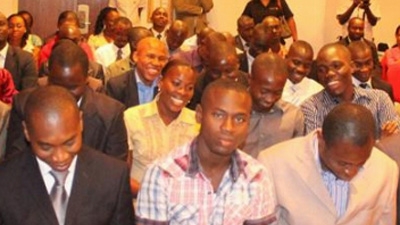ABIDJAN, August 27, 2012–Young Africans want more jobs and in Côte d’Ivoire the government and its partners are working together to create them.
With funding from the World Bank, Côte d’Ivoire's Employment and Social Affairs Ministry has launched an initiative to create more jobs and help youth develop skills.
“There are many unemployed or under employed youth that participated in the recent crisis,” says Adama Bamba, National Coordinator for the Côte d’Ivoire Emergency Youth Employment and Skills Development project (PEJEDEC). “The most active group in the conflict was the unemployed youths. Today, many of them have graduated but they just hang out in the market; they’ve never had a job in their life and they’re just waiting.”
The post-electoral crisis had a negative impact on the country’s socio-economic fabric. Côte d’Ivoire’s high unemployment rate went up even further with young people especially bearing the heaviest cost. According to the National Institute of Statistics (INS), an estimated 60 percent of Ivorians between the ages of 15 and 35 are unemployed.
Keeping peace through productivity
In countries with recent memories of war and conflict, the task of keeping the peace while re-building the national economy and restoring people’s confidence can become very difficult indeed if the country still suffers from grinding poverty and its young people are mostly unemployed. In Côte d’Ivoire, the situation poses even greater risks for the youth, says Hamoud Abdel Wedoud Kamil, the World Bank’s Senior Education Specialist and task leader of the PEJEDEC project.
“Youth unemployment increases the risk of social disruption and violent conflict,” he says. “If we don’t do this and don’t have a message of hope for the youth, it’s like we’re doing nothing. We need to give them opportunities to use pens and not weapons.”
Since launching six months ago, the Emergency Youth Employment and Skills Development Project (PEJEDEC) worth $50 million, has seen some early results.
A key outcome of the project has been the creation of a partnership between the government and the country’s private sector to offer paid internships with local companies to youths between the ages of 15 and 35. At the end of training, participants can use their new skills to apply for jobs within the company or outside, and in some cases can start their own businesses.
Compagnie Ivorienne d'Electricité (CIE), the country’s privately-managed power utility, will begin training 249 youth on August 28 at their in-house training facility in Abidjan. Telecommunications giant Orange has hired 150 youth and is training them in telecommunications trades. Other companies have signed on to accept interns, including the European Chamber of Commerce which will place 650 graduates in their 25 member companies.
Altogether nearly 3000 young people have started or will start internships by October.
In addition to corporate internships, the project will also include a labor and public works component that places young men and women with fewer years of education in public works jobs.
Twenty-eight-year-old, M’Balou Kanté left school in 2009 with a Telecommunications Engineering degree and has been unable to find permanent work since. She read about the youth employment project in a local newspaper and signed up. On August 21 she began an internship at Orange headquarters in the Cocody Deux Plateaux neighborhood of Abidjan.
“I would get a few contracts but it wasn’t anything permanent so I was home for three to six months at a time,” Kanté said. “It’s not easy because since the crisis many companies closed down which resulted in many qualified young people being at home not doing anything.”
Now, says Kanté, she’s at a company suited to her skills.
“It’s a big company and for me as a telecom engineer I couldn’t hope for better,” she said.” This is really where I needed to be.”
Creating economic stability
The World Bank is working closely with African governments and civil society organizations to find ways to boost employment, particularly for youth. The Bank’s annual World Development Report, due out in October, will outline how governments can create more jobs for youth and by extension boost economic development.
“Creating jobs for youth makes economies stronger because it leads to productivity and more consumers with money to spend,” Kamil said. “In Côte d’Ivoire, beyond a lasting peace, we need economic stability.”

